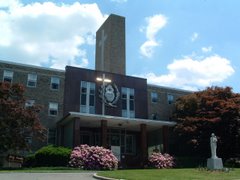 Fr. Meninger has been a Centering Prayer teacher for 30 years. Click here for more information about Holy Family’s Advent Centering Prayer retreat.
Fr. Meninger has been a Centering Prayer teacher for 30 years. Click here for more information about Holy Family’s Advent Centering Prayer retreat. It's that time of year again when we are given the ominous prophetic words concerning the end of the world. One line especially from the second reading from First Thessalonians has been given an over literal prominence; "We who are alive, who are left, will be caught up together with those Christians already dead, in the clouds to meet the Lord in the air." This verse has been recognized for centuries by theologians as fanciful, apocalyptic language certainly not to be taken literally.
About 200 years ago a sincere but misguided preacher insisted it be taken literally and has acquired some considerable following. Many of them are sincere, many are paranoid, and some use it to exploit gullible Christians for their own financial profit.
Please note that the first reading from the Book of Wisdom contains a beautiful promise. Wisdom is available to those who seek it. Wisdom is knowing the will of God and how it is carried out in our personal lives and in the world. Many early Christians who read First Thessalonians lacked true wisdom. If Jesus was coming soon then there wasn't much point in going to work, growing food or getting an education. So they spend their time waiting to be caught up into the skies. The apostles did this on Ascension Thursday when Jesus ascended into heaven. An angel appeared and said in effect, “Why do you stand here idle, gazing up into the heavens, Jesus will come again in the clouds and glory…meanwhile, get back to work.” This necessitated the writing of Second Thessalonians in which they were told, once again, to go back to work.
Wisdom is also prominent in the parable of the wise virgins. Their wisdom was simply common sense, something we all need. Julian of Norwich is a veritable font of wisdom, that is, of common sense. She understood that God is a God of love. There is no such thing as the wrath of God. This is a human construct. God is not a judge, or avenger. He does not condemn , punish or criticize. Again, these are all human constructions. God is a God of compassion and forgiveness and he offers us not blame but pity.
In Heaven, Julian tells us, even our sins will be to our honor because God will reward us for our repentance. The greater our sins, the greater is God's compassion. This is why Jesus tells us that there will be more joy in heaven over one sinner who repents than over 99 who have no need of repentance.
Wisdom, common sense, will tell us that if the Triune God is all-powerful, all wise and all loving, then this world which he created in his wisdom out of his love will come to the end for which he created it, namely himself.
The English Jesuit poet, Gerard Manley Hopkins, expressed this well in a poem called God's Grandeur.
The world is charged with the grandeur of God.
It will flame out, like shining from shook foil;
It gathers to a greatness, like the ooze of oil crushed.Why do men then now not reck his rod?
Generations have trod, have trod, have trod;And all is seared with trade; bleared, smeared with toil;
And wears man's smudge and shares man's smell:the soil is bare now, nor can foot feel, being shod.
And for all this, nature is never spent;There lives the dearest freshness, deep down things.
And though the last lights off the black West wentOh, morning, at the brown brink, Eastward springs –
Because the Holy Ghost, over the bentWorld broods with warm breast and with, ah! bright wings.
So, even though we have spoiled it, the world is always on the brink of a new dawn. The theological virtue of hope is one of the three ways by which God communicates himself to us. This is not something he is going to do, he is always doing it. He is the promise and the fulfillment of the promise. He is the not -- yet and the already -- here. The victory has been won for us we have only to reach out and claim it. May God grant us the wisdom to do so. May you be happy, May you be free, May you be loving, May you be loved.
Father William Meninger
St. Benedicts’ MonasterySnowmass, Colorado
For more information about Centering prayer and Fr. Meninger visit: http://www.contemplativeprayer.net/
For more information about Centering prayer and Fr. Meninger visit: http://www.contemplativeprayer.net/



No comments:
Post a Comment